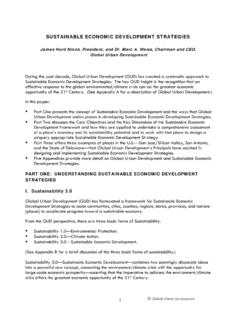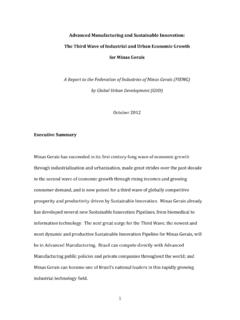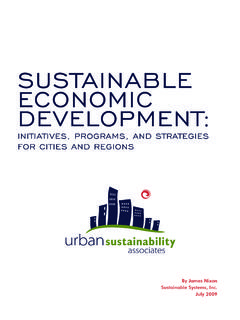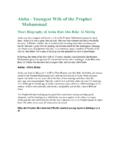Transcription of CREATING A WORLD WITHOUT POVERTY: SOCIAL …
1 GLOBAL URBAN DEVELOPMENTV olume 4 Issue 2 November 20081 Global Urban DevelopmentCREATING A WORLD WITHOUT poverty : SOCIALBUSINESS AND THEFUTURE OF CAPITALISMM uhammad Yunus1. A New Kind of BusinessSince the fall of the Soviet Union in 1991, free markets have swept the globe. Free-market economics has takenroot in China,Southeast Asia, much of South America, Eastern Europe, and even the former Soviet Union. Thereare many things that free markets do extraordinarily well. When we look at countries with long histories undercapitalist systems in Western Europe and North America we see evidence of great wealth.
2 We also seeremarkable technological innovation, scientific discovery, and educational and SOCIAL progress. The emergence ofmodern capitalism three hundred years ago made possible material progress of a kind never before seen. Today,however almost a generation after the Soviet Union fell a sense of disillusionment is setting be sure, capitalism is thriving. Businesses continue to grow, global trade is booming, multinational corporationsare spreading into markets in the developing WORLD and the former Soviet bloc, and technological advancementscontinue to multiply.
3 But not everyone is benefiting. Global income distribution tells the story: Ninety-four percent ofworld income goes to 40 percent of the people,while the other 60 percent must live on only 6 percent of worldincome. Half of the WORLD lives on two dollars a day or less, while almost a billion people live on less than one dollara is not distributed evenly around the WORLD ; specificregions suffer its worst effects. In sub-Saharan Africa,South Asia, and Latin America, hundreds of millions of poor people struggle for survival. Periodic disasters, such asthe 2004 tsunami that devastated regions on the Indian Ocean, continue to kill hundreds of thousands of poor andvulnerable people.
4 The divide between the global North and South between the WORLD s richest and the rest of the countries that have enjoyed economic success over the past three decades have paid a heavyprice,however. Since China introduced economic reforms in the late 1970s, it has experienced rapid economic growth,and, according to the WORLD Bank, over 400 million Chinese have escaped poverty . (As a result, India has nowbecome the nation with the largest population of poor people, even though China has a bigger overall population.)But all of this progress has brought with it a worsening of SOCIAL problems.
5 In their rush to grow, Chinese officialshave looked the other way when companies polluted the water and air. And despite the improved lot of many poor,the divide between the haves and have-nots is widening. As measured by technical indicators such as the Ginicoefficient, income inequality is worse in China than in in the UnitedStates, with its reputation as the richest country on earth, SOCIAL progress has beendisappointing. After two decades of slow progress, the number of people living in poverty has increased in recentyears.
6 [1]Some forty-seven million people, nearly a sixth of the population, have no health insurance and havetrouble getting basic medical care. After the end of the Cold War, many hoped for a "peace dividend" defensespending could decline, and SOCIAL programs for education and medical care would increase. But especially sinceSeptember 11, 2001, the government has focused on military action and security measures, ignoring the global problems have not gone unnoticed. At the outset of the new millennium, the entire WORLD mobilized toaddress them.
7 In 2000, WORLD leaders gathered at the United Nations and pledged, among other goals, to reducepoverty by half by 2015. But after half the time has elapsed, the results are disappointing, and most observers thinkGLOBAL URBAN DEVELOPMENTV olume 4 Issue 2 November 20082 Global Urban Developmentthe Millennium Goals will not bemet. (My own country of Bangladesh, I'm happy to say, is an exception. It is movingsteadily to meet the goals and is clearly on track to reduce poverty by half by 2015.)What is wrong? In a WORLD where the ideology of free enterprise has no real challenger, why have free marketsfailed so many people?
8 As some nations march toward ever greater prosperity, why has so much of the WORLD beenleft behind?The reason is simple. Unfettered markets in their current form are not meant to solve SOCIAL problemsand insteadmay actually exacerbate poverty , disease, pollution, corruption, crime, and support the idea of globalization that free markets should expand beyond national borders, allowing trade amongnations and a continuing flow of capital, and with governments wooing international companies by offering thembusiness facilities, operating conveniences, and tax and regulatory advantages.
9 Globalization, as a generalbusiness principle, can bring more benefits to the poor than any WITHOUT proper oversight andguidelines, globalization has the potential to be highly trade is like a hundred-lane highway criss-crossing the WORLD . If it is a free-for-all highway, with no stoplights,speed limits, size restrictions, or even lane markers, its surface will be taken over by the giant trucks from theworld s most powerful economies. Small vehicles a farmer's pickup truck or Bangladesh's bullock carts andhuman-powered rickshaws will be forced off the order to have win-win globalization, we must have fair traffic laws, traffic signals, and traffic police.
10 The rule of"the strongest takes all" must be replaced by rules that ensure that the poorest have a place on the the global free market falls under the control of financial the same way, local, regional, and national markets need reasonable rules and controls to protect the interests ofthe poor. WITHOUT such controls, the rich can easily bend conditions to their own benefit. The negative impact ofunlimited single-track capitalism is visible every day in global corporations that locate factories in the WORLD spoorest countries, where cheap labor (including children) can be freely exploited to increase profits; in companiesthat pollute the air, water, and soil to save money on equipment and processes that protect the environment.










